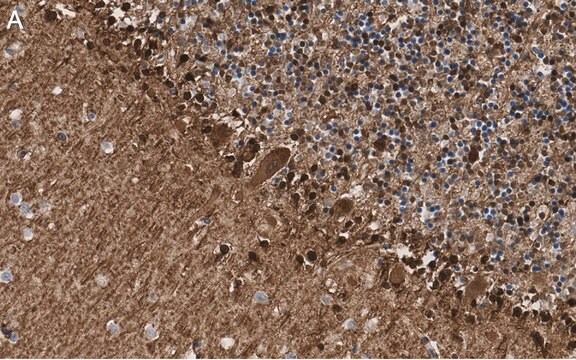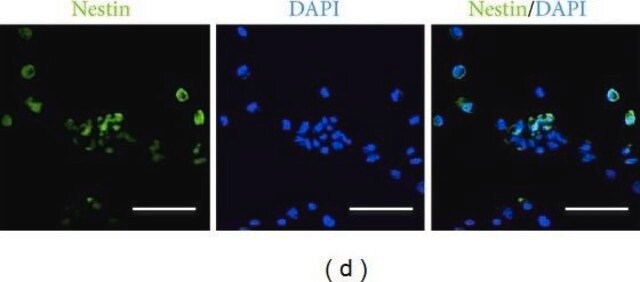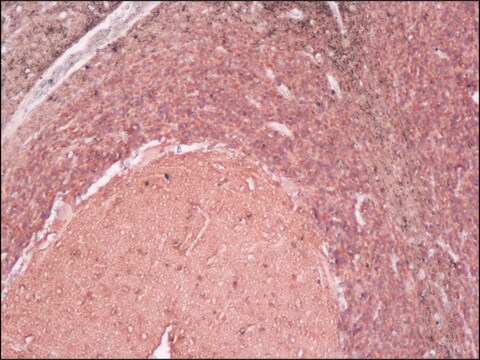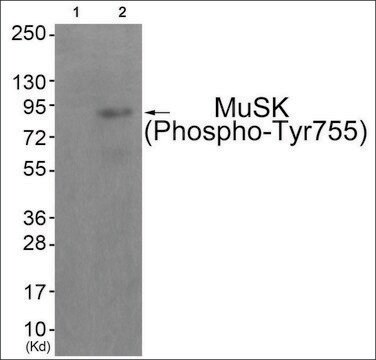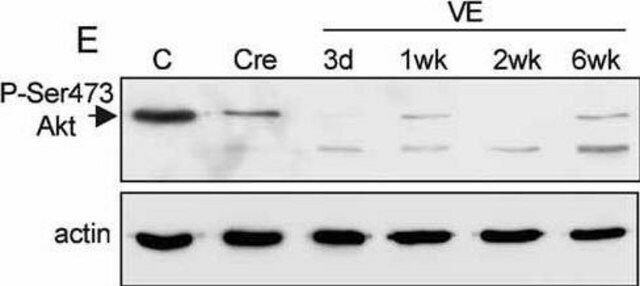ABS549
Anti-MuSK Antibody
serum, from rabbit
Sinonimo/i:
Muscle, skeletal receptor tyrosine-protein kinase, Muscle-specific tyrosine-protein kinase receptor, MuSK, Muscle-specific kinase receptor
About This Item
IP
WB
immunoprecipitation (IP): suitable
western blot: suitable
Prodotti consigliati
Origine biologica
rabbit
Livello qualitativo
Forma dell’anticorpo
serum
Tipo di anticorpo
primary antibodies
Clone
polyclonal
Reattività contro le specie
mouse, human
tecniche
immunohistochemistry: suitable
immunoprecipitation (IP): suitable
western blot: suitable
N° accesso NCBI
N° accesso UniProt
Condizioni di spedizione
wet ice
modifica post-traduzionali bersaglio
unmodified
Informazioni sul gene
human ... MUSK(4593)
Descrizione generale
Immunogeno
Applicazioni
Signaling
Signaling Neuroscience
Immunohistochemistry Analysis: A representative lot detected MuSK in mouse soleus muscle tissue (Simeone, L., et al. (2010). The Journal of Neuro. 30(19):6620-6634).
Immunoprecipitation Analysis: A representative lot immunoprecipitated MuSK in C2C12 cell lysate (Simeone, L., et al. (2010). The Journal of Neuro. 30(19):6620-6634).
Qualità
Western Blotting Analysis: A 1:1,000 dilution of this antibody detected MuSK in 10 µg of HEK293 cell lysate.
Descrizione del bersaglio
Stato fisico
Stoccaggio e stabilità
Handling Recommendations: Upon receipt and prior to removing the cap, centrifuge the vial and gently mix the solution. Aliquot into microcentrifuge tubes and store at -20°C. Avoid repeated freeze/thaw cycles, which may damage IgG and affect product performance.
Esclusione di responsabilità
Non trovi il prodotto giusto?
Prova il nostro Motore di ricerca dei prodotti.
Codice della classe di stoccaggio
12 - Non Combustible Liquids
Classe di pericolosità dell'acqua (WGK)
WGK 1
Punto d’infiammabilità (°F)
Not applicable
Punto d’infiammabilità (°C)
Not applicable
Certificati d'analisi (COA)
Cerca il Certificati d'analisi (COA) digitando il numero di lotto/batch corrispondente. I numeri di lotto o di batch sono stampati sull'etichetta dei prodotti dopo la parola ‘Lotto’ o ‘Batch’.
Possiedi già questo prodotto?
I documenti relativi ai prodotti acquistati recentemente sono disponibili nell’Archivio dei documenti.
Il team dei nostri ricercatori vanta grande esperienza in tutte le aree della ricerca quali Life Science, scienza dei materiali, sintesi chimica, cromatografia, discipline analitiche, ecc..
Contatta l'Assistenza Tecnica.